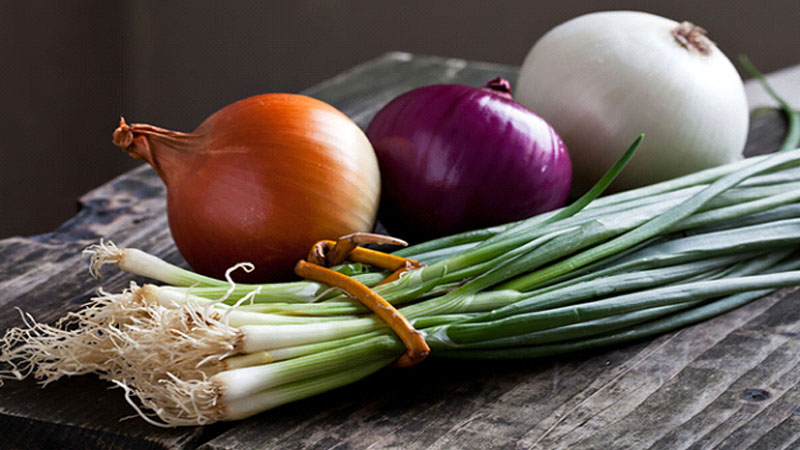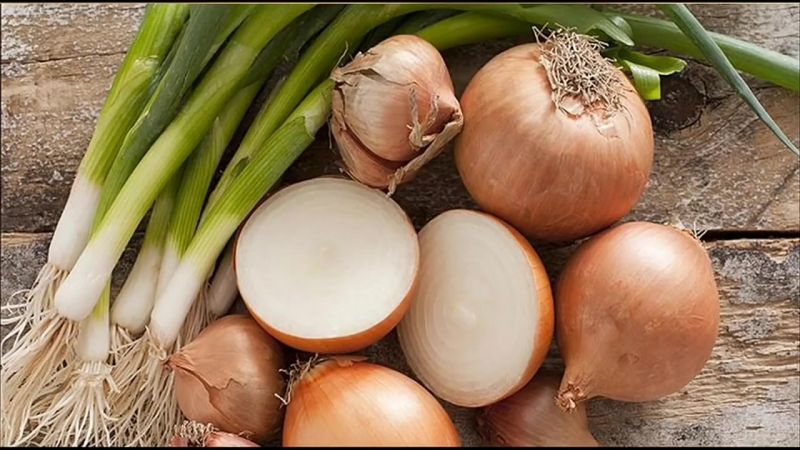Can an onion allergy appear, how does it manifest and what to do
Onions have been scientifically proven to be an extremely healthy vegetable. It contains many vitamins and microelements that help the human body fight diseases and ailments. At the same time, onions are one of the most affordable products - you can buy them at any time of the year at the nearest supermarket.
However, despite the multifaceted benefits, onions can cause an allergic reaction in both adults and children. This article will tell you which component of the vegetable provokes allergies, how to identify and get rid of it.
The content of the article
Is onion allergy possible?

Onions are not allergenic vegetables, but the proteins in their composition sometimes cause pathological reactions in the body. This is a product that is not only eaten, but also used for medicinal purposes. In a person who is susceptible to allergies, he is able to provoke a negative reaction, even if he does not have a hereditary predisposition.
All types of onions are capable of causing allergies, and the interaction of antigens of each type of onion with each other causes cross-allergic reactions. As a result, the body reacts equally negatively to onions, red onions, leeks, and even garlic. But the most allergenic of all varieties are green and shallots.
If a person has such an allergy, the symptoms appear not only when this vegetable is eaten, they are possible even upon contact with it:
- the use of natural cosmetics, which include onions;
- interaction with onion dust or husks;
- the use of canned food, in the preparation of which onions were used, even if they were later removed or put in a small amount.
It can be difficult to immediately identify whether a vegetable will be an allergen for a particular person. This allergy tends to accumulate, so the first symptoms sometimes appear only after a few days or weeks. Latent allergies are especially dangerous because they are more difficult to diagnose. Sometimes the symptoms do not appear directly at all, but a person may have problems with the digestive, nervous or respiratory system - all this against the background of a hidden allergy.
Allergy is easy to confuse with vegetable intolerance, but these are different pathological reactions:
- Onion intolerance is not an allergy to it. From it only problems with the gastrointestinal tract arise, which are associated with the fact that the body does not have enough special enzymes to digest it.
- Intolerance arises from the rejection by the body of drugs that are used to process onions during sowing and storage.
The strongest allergen is fresh onion and its juice, boiled onion is less dangerous for the health of an allergic person, and the safest is fried.
Important. The least allergenic onion - a reaction to it occurs in only 0.7% of cases of onion allergy.
The reasons

The process of an allergic reaction to onions looks like this: the human immune system perceives the substances that make up the vegetable as something hostile to the body. As a result, the hormonal system begins to actively produce histamine, which is in a dormant state in a healthy body. The release of histamine is accompanied by symptoms that make up the typical clinical picture of allergies.
The main substances that provoke the reaction in the composition of the vegetable are profilin and diallyl disulfide. Let's figure out in more detail what these substances are:
- Profilin Is a vegetable protein.People who have gluten intolerance should use onions with caution because of the vegetable protein in the composition. It breaks down during cooking, so boiled or fried onions are not as allergenic as fresh ones.
- Diallyl disulfide Is an organic sulfide. It is he who gives the onion such a specific smell. It is found in all types of vegetables. Able to cause a pathological reaction of the body to this vegetable. An allergen provokes skin reactions - redness, rash, itching. In difficult cases, asthma or rhinitis.
It is interesting:
How is potato allergy manifested in children and adults?
What to do in case of pumpkin allergy: treat effectively and prevent it in advance.
Symptoms

They appear in either mild or severe form.
Light form:
- itching of the skin, hives, rashes on the body;
- cough, shortness of breath, wheezing, sore throat;
- runny nose;
- swelling of the eyelids;
- heartburn, nausea, or vomiting.
Severe form:
- a sharp increase in pressure;
- Quincke's edema;
- swelling of the larynx and lungs;
- anaphylactic shock.
Strong allergens - nuts, seafood - often lead to such difficult situations, but due to a cross reaction, this also happens when eating a vegetable.
Important. If you notice one or more of the listed symptoms, be sure to see your doctor.
The main thing is to quickly figure out what the allergy has happened to, pay attention to the symptoms and act immediately so that this does not lead to serious consequences, especially when it comes to children.
Vegetable reaction in children
In children, the immune system begins to work stably only by the age of 7, so they are especially vulnerable. Boiled onions begin to be introduced into the child's diet at the age of 8-10 months, and fresh vegetables are recommended to be consumed only after 3 years - this applies to onions, green onions should be excluded up to 7 years old, since it contains the largest number of allergens.
Important. In kindergartens, green onions are never included in the children's menu.
Symptoms in children:
- small skin rash, redness, watery blisters;
- peeling of the scalp;
- rhinitis;
- dermatitis or diathesis;
- nausea and vomiting;
- cough and shortness of breath.
The manifestation of allergies is often confused with colds or infectious diseases, so if you find similar symptoms, contact your pediatrician for further examination.
Symptoms in infants:
- intense crying and anxiety;
- sleep disturbance;
- skin rashes;
- colic and abdominal pain;
- frequent regurgitation.
In infants, allergies are manifested due to the ingress of onion substances into the mother's milk. If such manifestations are noticed, exclude this vegetable from your diet and observe for 2-3 days the baby's reaction, if the condition does not improve, contact the pediatrician.
Remember that onion allergies tend to accumulate, so don't jump to conclusions. After including onions in your diet during breastfeeding, observe the baby's reaction for several days.
Important. If the baby shows signs of choking or shortness of breath, call an ambulance.
Symptoms in adults
In an adult, allergies are less pronounced - except for cases when a person is prone to severe allergic reactions.
Allergy can manifest itself not only on onion consumption, but also on its smell or cosmetics, which include vegetable substances.
In an adult, the manifestation of a pathological reaction is divided into areas of its impact.
Dermal:
- itching and skin rashes;
- swelling of the mucous membranes.
Gastrointestinal tract:
- indigestion;
- heartburn;
- sharp abdominal pain;
- constipation or loose stools.
Respiratory:
- cough and runny nose;
- redness and swelling of the eyelids;
- labored breathing.
First aid for severe cases of allergies

The most dangerous thing that allergies can lead to is Quincke's edema, anaphylactic shock, Lyell's syndrome and Minier's disease.
The symptoms in these cases are:
- severe vomiting;
- fainting and dizziness;
- severe pulmonary and laryngeal edema.
With such symptoms, a person must be urgently hospitalized.
If a person has the ability to swallow, you need to give him an antihistamine and be sure to notify the ambulance.
Important. While medical care is on the way, place the person on a firm surface, provide free air and isolate them from the allergen.
Treatment
To treat a pathological reaction to onions, first, an examination of the body is carried out... Allergies are often confused with other diseases, so if there is a suspicion of it, take a blood test to identify the allergen. To do this, contact an allergist who will prescribe appropriate studies.
The identified reaction will determine whether the human body is able to absorb onions. His further nutrition depends on this. Perhaps the onion will have to be completely excluded from the diet, to avoid its smell and not to use cosmetics with its components in the composition.
Medication therapy
Drug treatment includes the use of enterosorbents and antihistamines. Enterosobrenty prevent or mitigate intoxication of the body. These include: "Enteros-gel", "Polysorb", "Smecta".
Antihistamines help to fight inflammatory reactions and manifestations of allergies: "Zirtek", "Zodak", "Suprastin".

Traditional methods of treatment
It is worth resorting to traditional methods of treatment only after consulting a doctor. Such therapy is not considered as the main method of treatment, but is used only in combination with medications or procedures prescribed by a doctor.
Relief of runny nose:
- decoction of chamomile or nettle;
- mummy.
Reducing itching and reducing swelling:
- potato gruel;
- baths from a decoction of chamomile, string or Jerusalem artichoke root.
With inflammation of the skin:
- aloe oil;
- dandelion decoction.
For preventive measures, the following actions are sufficient:
- eat less fresh onion, boil or fry it better;
- if symptoms are found, eliminate the product from the diet completely;
- always carry antihistamines with you;
- strengthen overall immunity.
Read also:
Can there be an allergy to carrots, how it manifests itself and how it is treated.
Can rice allergy occur and how does it manifest?
How to recognize a beet allergy and quickly get rid of its symptoms.
Conclusion
Allergic reactions in humans can occur even to the most useful foods. Onion belongs to such products. It supports immunity in the season of colds, helps to fight many of the body's problems. However, in some people, this healthy vegetable can cause an allergic reaction. If this happens, exclude the vegetable from the diet and consult a doctor for advice and proper treatment.